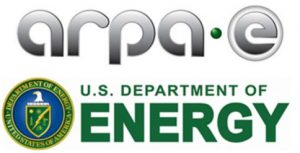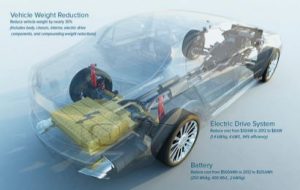by Jon LeSage, editor and publisher, Green Auto Market
Here’s my take on the 10 most significant and interesting occurrences during the past week…….
 ARPA-E awards $125 million: The U.S. Dept. of Energy announced the awarding of $125 million for innovative energy technologies by the Advanced Research Projects Agency-Energy (ARPA-E). The 41 projects include advanced vehicle technologies and alternative fuels, including: Achates Power, Inc. of San Diego, Calif., winning $9,002,986 to develop a multi-cylinder opposed piston engine operating with compression ignition; the University of Michigan in Ann Arbor will develop a high-efficiency engine system that integrates a compact micro-hybrid configuration of a supercharger with an electric waste heat recovery system and employs high rates of recirculated exhaust gases, which was granted $1,923,845; another University of Michigan project was granted $3,500,000 for electrode structures and manufacturing techniques to incorporate lithium-conducting ceramic electrolytes into solid-state batteries; researchers at Corning Incorporated in Corning, N.Y., won $3,102,359 and will develop roll-to-roll manufacturing techniques to produce thin ceramic electrolytes for solid-state batteries for higher energy density than conventional lithium-ion batteries. Read more about other transportation and energy grants made in the ARPA-E announcement.
ARPA-E awards $125 million: The U.S. Dept. of Energy announced the awarding of $125 million for innovative energy technologies by the Advanced Research Projects Agency-Energy (ARPA-E). The 41 projects include advanced vehicle technologies and alternative fuels, including: Achates Power, Inc. of San Diego, Calif., winning $9,002,986 to develop a multi-cylinder opposed piston engine operating with compression ignition; the University of Michigan in Ann Arbor will develop a high-efficiency engine system that integrates a compact micro-hybrid configuration of a supercharger with an electric waste heat recovery system and employs high rates of recirculated exhaust gases, which was granted $1,923,845; another University of Michigan project was granted $3,500,000 for electrode structures and manufacturing techniques to incorporate lithium-conducting ceramic electrolytes into solid-state batteries; researchers at Corning Incorporated in Corning, N.Y., won $3,102,359 and will develop roll-to-roll manufacturing techniques to produce thin ceramic electrolytes for solid-state batteries for higher energy density than conventional lithium-ion batteries. Read more about other transportation and energy grants made in the ARPA-E announcement.- Geely and Cadillac take on China mandates: Chinese automaker Geely Automobile Holdings has committed to meeting “new energy” vehicle government mandates more than any other domestic OEM; during the next five years, more than 90% of its new models will come equipped with alternative-energy powertrains. About two-thirds of Geely’s new-energy vehicle models will be conventional gasoline-electric hybrids and plug-in hybrids by 2020, with the remaining new-energy vehicles being battery-electric vehicles. Geely, which has been developing vehicles with Volvo Cars, also said it aims to make “substantial progress” on fuel cell vehicles by 2020. Cadillac will be rolling out plug-in hybrid versions of most of its vehicles in coming years to meet China’s tightening regulations, according to Cadillac president Johan de Nysschen. Adding a battery electric luxury car to compete directly with Tesla isn’t in the brand’s business plan, he said. There are plenty of other models meeting U.S. fuel economy and emissions regulations, including the Chevy Volt and fuel efficient cars, he said.
- GM & Daimler committed to diesel: The Volkswagen diesel reporting scandal isn’t pushing General Motors or Daimler out of diesel-engine vehicles. GM product chief Mark Reuss thinks that diesel demand among truck buyers won’t be affected by the fallout from the VW scandal, and that its diesel-powered Chevrolet Cruze will be doing well. GM has begun production of diesel-equipped Chevy Colorado and GMC Canyon midsize pickups. These pickups will join the V-8 Duramax diesel engines on its heavy-duty full-size pickups. Next year, GM will roll out a 1.6L diesel in the next-generation Cruze; the automaker will roll out at least one more diesel car, but hasn’t yet released details on it. Daimler’s commercial truck operation will invest $375 million at a complex near Detroit to build diesel engines for medium-duty trucks, expanding a strategy of building and selling trucks, engines, transmissions and axles as a package. It’s not competing directly with VW light-duty passenger cars, but the commitment to diesel technology is still significant during this time. In other VW news, U.S. Dept. of Justice investigators are investigating German auto supplier Robert Bosch GmbH for its role in VW’s scheme to cheat U.S. emission standards. Bosch built key components in the diesel engine used in six Volkswagen models and one Audi model that the automaker has admitted to rigging to defeat emissions tests.
- Tesla researches German battery factory: Tesla Motors has been in discussions with the German government over the prospect of building a battery factory in the country. Tesla may seek financial backing from the government. This may be targeted at Tesla’s competition in the luxury electric vehicle space with German automaker BMW and would support the opening of Tesla’s Gigafactory in Nevada. Tesla wouldn’t make comments to the media on a German battery factory, saying that there are “no current plans to build a battery factory in Germany.” Tesla did announce that it will recall the entire Model S fleet to deal with a potential seat belt defect. That will mean brining in 90,000 of these cars for inspection by Tesla. The recall came from the discovery in Europe two weeks ago of a single Tesla Model S with a “front seat belt that was not properly connected to the outboard lap pretensioner,” Tesla told its customers by email.
- Green truck awards: The Ford F-150 pickup has been named the Green Truck of the Year, and the Ram ProMaster City has won the Commercial Green Car of the Year. While the 2016 Chevrolet Volt won Green Car of the Year at the LA Auto Show (see article that follows), the truck awards were announced at the San Antonio Auto & Truck Show.
- Volvo and Microsoft going for autonomous vehicles: Volvo’s partnership with Microsoft will also extend to autonomous driving and other advanced automotive tech. The automaker announced it will work with Microsoft yet-to-be-released HoloLens augmented reality device. Volvo will also be working on autonomous driving technologies as well with Microsoft, and plants to use the enormous amount of data generated from connected cars to create other new services.
- Green Truck Summit expanding: The Green Truck Summit, held annually in conjunction with The Work Truck Show, features a more comprehensive educational program for 2016. The event includes a full day of in-depth general sessions on innovations for vocational trucks on March 1. Attendees can also choose from more than 30 Green Truck Summit and Work Truck Show concurrent sessions covering a range of topics March 2-3. Produced by NTEA, the Summit takes place at the Indiana Convention Center in Indianapolis.
- Google Express expands in delivery business: Google has joined up with Amazon in the product delivery space by expanding its Google Express service into Southern California. Just in time for holiday shopping, Google Express is offering next-day service for shoppers in Los Angeles, San Diego, Orange County, and the Inland Empire. Google Express is already been in place in Northern California and West Los Angeles, along with Manhattan, Boston, Chicago, Washington, and in several states in the Midwest. Participating retails merchants include Costco, Target, Kohl’s, and Walgreens. Soon after the Google Express announcement, Amazon said that it’s expanding its same-day Prime Now delivery service in the San Diego area. Amazon now offers free same-day delivery options in 24 metropolitan areas — including Los Angeles and San Diego.
- Renewable diesel takes off at Propel stations: Consumer adoption of Propel Fuel’s Diesel HPR (High Performance Renewable) fuel has shot up 300% since its introduction in Southern California in August 2015, the company said; that’s compared to its former biodiesel product (B20). Diesel HPR is a low-carbon fuel that meets the ASTM D-976 petroleum diesel specifications for use in diesel engines while offering drivers better performance and lower emissions. A California Air Resources Board study shows that renewable diesel can reach up to 70% greenhouse gas reduction compared to petroleum diesel.
- Lightning Hybrids wins NREL award: Lightning Hybrids received the “Best Venture” award for its hydraulic hybrid system at the Industry Growth Forum held last week in Denver, which was hosted by the Energy Department’s National Renewable Energy Laboratory (NREL). The hydraulic hybrid system for medium and heavy duty vehicles has strong global market opportunities and provides benefits to a large and diverse group of stakeholders by providing fleets with a way to run cleaner and more efficient vehicles, the company said. The award named 30 emerging cleantech industry company finalists from a field of 115 to present their technologies and business models to a panel of knowledgeable investor judges.

